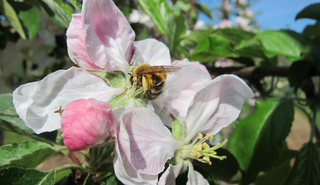Early apple blossom sparks new FruitWatch science plea
15 February 2023

Gardeners, walkers and others are being asked to see how warming temperatures are affecting the fruit trees in their gardens, allotments or parks this spring.
FruitWatch, which received 6,000 submissions from the public in its first phase in 2022, launched last year as part of a joint project between the University of Reading and Oracle for Research.
The scheme, which restarted in February, monitors changes and trends in fruit tree flowering dates, with the data helping scientists further develop an understanding of the role climate change has on the coming of spring in flowering fruit trees.
The latest request to an army of citizen scientists follows initial findings by the team, using the 2022 data, showing that apple trees are flowering earlier with warmer temperatures. Earlier blossom times could cause problems for pollinators, such as bumblebees, and lead to poorer crops, pushing up prices on some British apples.
Dr Deepa Senapathi, an ecologist at the University of Reading, one of the lead scientists in the FruitWatch project, said: “We had an overwhelmingly positive response to our project last year, which has already contributed to our understanding of the impact of climate change on British fruit, and we are hoping more people will be encouraged to take part in 2023.
“We know that rising temperatures can make first flowering and full bloom occur earlier than in the past, and this can have potentially negative effects on fruit production. It may also have a detrimental impact on at-risk pollinators, such as some rare species of solitary bees, if flowering dates do not match with the emergence of those pollinator species.
“We are enormously grateful to all the people who are taking part, as their results are helping us to understand what we can do to help British crops and wildlife adapt to a rapidly changing climate.”
FruitWatch
As flowering and full bloom occurs earlier as the climate warms, there is an increased risk of insufficient pollination by insects and consequently negative effects on fruit production. This is because timing of insect pollinator activity may not respond in the same way as flowering plants and trees, or at the same rates, cutting the crucial link between fruit trees and the insects that pollinate them.
To understand this relationship better, FruitWatch scientists are asking for the public’s help to record when fruit trees - apple, pear, plum and cherry - first come into bloom. This data is uploaded into an interactive map and will be used to show how climate change may be affecting flowering times.
Currently, only two long term records of fruit tree phenology exist in the UK, both from Kent, which makes it difficult to draw confident conclusions that the pollinator-flower relationship observed at these sites is consistent across the country. Results from the first phase of FruitWatch are currently being analysed, with over 6,000 submissions from all parts of the UK.
Big consequences
The latest phases of FruitWatch comes after research from the project was published by Chris Wyver, University of Reading PhD student, in the academic journal Agriculture and Forest Meteorology.
The study compares the timings of bee emergence and apple blossom to understand if their relationship changes in different climates.
It found that these patterns are partially driven by climate. Wild bees emerged an average of 8.5 days earlier for every extra degree in temperature, compared with 6.5 days per degree advancement for apple blossom.
Wyver said: “Apple trees have a short-flowering window of between two and three weeks, so falling out of sync with pollinators can have big financial consequences for the grower, who may get fewer, lower quality apples.
“It could mean farmers are forced to pollinate their crops with managed honeybees, brought in from outside the area, costing growers money and potentially increasing costs to consumers.”
Chris Wyver, Simon G. Potts, Rowan Edwards, Mike Edwards, Deepa Senapathi,
Climate driven shifts in the synchrony of apple (Malus x domestica Borkh.) flowering and pollinating bee flight phenology,
Agricultural and Forest Meteorology,
Volume 329, 2023,109281,ISSN 0168-1923, https://doi.org/10.1016/j.agrformet.2022.109281.

